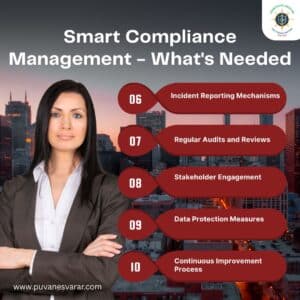Effective compliance management is crucial for organizations to navigate the complex regulatory landscape. Here’s a list of essential elements needed for smart compliance management:

1. **Comprehensive Compliance Framework**: Establish a clear framework that outlines policies, procedures, and standards necessary to meet regulatory requirements.
2. **Risk Assessment Tools**: Implement tools that help identify, assess, and prioritize compliance risks within the organization.
3. **Training and Awareness Programs**: Regular training sessions for employees to ensure they understand compliance obligations and the importance of adhering to them.
4. **Automated Monitoring Systems**: Utilize technology to automate monitoring processes, allowing for real-time tracking of compliance status and potential violations.
5. **Document Management Solutions**: Maintain organized records of all compliance-related documents for easy access and audit readiness.
6. **Incident Reporting Mechanisms**: Establish clear channels through which employees can report compliance issues or breaches without fear of retaliation.
7. **Regular Audits and Reviews**: Conduct periodic audits to evaluate the effectiveness of the compliance program and make necessary adjustments based on findings.
8. **Stakeholder Engagement**: Involve key stakeholders in developing and maintaining the compliance strategy to ensure buy-in across all levels of the organization.
9. **Data Protection Measures**: Implement robust data security protocols to protect sensitive information related to compliance efforts.
10. **Continuous Improvement Process**: Foster a culture of continuous improvement where feedback is regularly sought and used to enhance compliance practices over time.
By integrating these elements into your organization’s approach, you can create a smart compliance management system that not only meets regulatory requirements but also supports overall business objectives.
